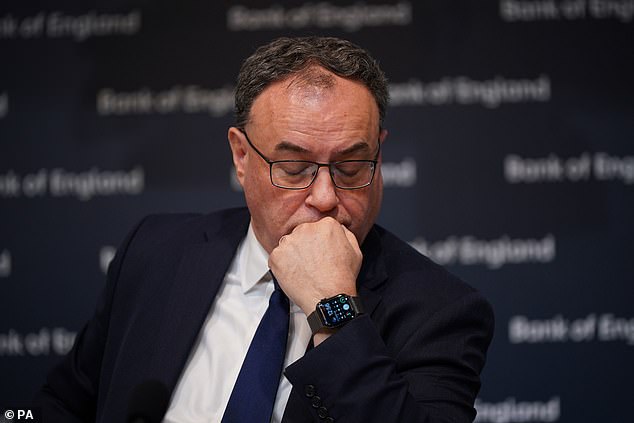Bank of England boss Andrew Bailey eyes ‘noticeable’ inflation fall
- Bailey expects a ‘noticeable decline’ in nominal interest rates based on the October figures
- Reactions come after official figures show that inflation remains stuck at 6.7%
- Inflation concerns have roiled global markets last week
Andrew Bailey yesterday praised “pretty encouraging” progress in the fight against inflation, despite fears it was proving difficult to beat.
The governor of the Bank of England said he expected a “noticeable fall” in nominal interest rates when the October figures were published next month, due to lower energy bills.
The comments came two days after official figures showed inflation stuck at a stubbornly high 6.7 percent, adding to speculation that more rate hikes would be needed.
Concerns about the prospect of interest rates remaining high for longer, and the impact of the conflict in the Middle East, have roiled global markets over the past week.
Yesterday, the latest turbulence pushed the yield on British 30-year bonds – the return investors expect for government loans over that period – to a new 25-year high.

Encouraged: Andrew Bailey said he expects a ‘noticeable drop’ in headline tariff when October figures are published next month due to lower energy bills
But Bailey, in an interview with the Belfast Telegraph, appeared optimistic about the latest inflation figures, which were expected to show a fall to 6.6 percent.
He told the newspaper that the Bank had not expected “much change” anyway.
“It wasn’t far from what we expected,” Bailey said.
He also highlighted that a measure of so-called “core” inflation – which excludes volatile factors such as energy and food – had fallen from 6.2 percent to 6 percent.
“Core inflation fell slightly from what we expected and that’s quite encouraging,” Bailey said. The Bank, which is tasked with reducing inflation to a 2 percent target, has previously forecast it will fall below 5 percent by the end of the year.
Wages, which are rising at 7.8 percent – a near-record pace – remain a concern, amid fears they could fuel further price rises.
“Measured wage growth is still well above anything consistent with the target,” Bailey said. “However, I understand that people want to see evidence that inflation is decreasing. I think we can see that evidence. I think we’ll see more evidence of that towards the end of the year.”
The comments came at the end of another chilling week for global markets, with UK, European and US shares falling sharply.
Some of the anxiety is driven by the conflict in the Middle East, which has pushed up oil prices amid fears of supply disruption if the war spreads.
That could harm the fight against inflation and hold back global growth. But even before the violence broke out, concerns about U.S. government finances — amid repeated threats of a government shutdown and rising debt — have led to a global sell-off in long-term 30-year bonds. Bond yields rise as prices fall.
Comments from US Federal Reserve Chairman Jerome Powell on Thursday – who said signs that inflation had already started to fall were “just the beginning” – did little to calm the feverish state in markets.
Richard Hunter, head of markets at Interactive Investor, said: ‘Investors were somewhat taken aback by Powell’s comments, which appeared to vacillate between implying no further rate hikes in the near future, while still leaving the door open for future rate hikes if conditions prevail. require this. ‘
